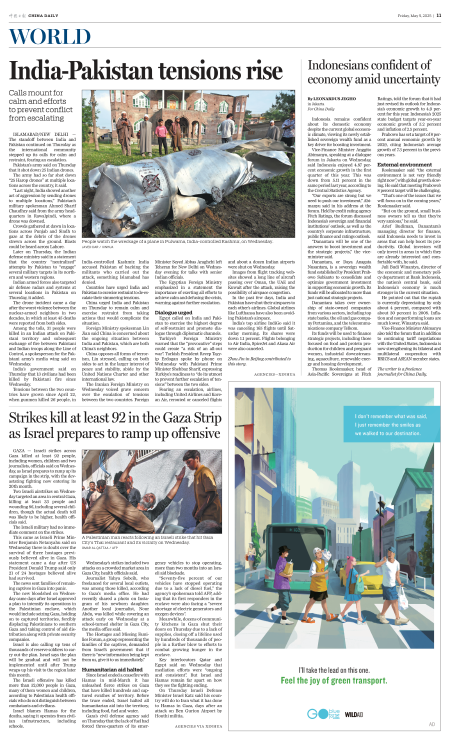
People watch the wreckage of a plane in Pulwama, India-controlled Kashmir, on Wednesday.
ISLAMABAD/NEW DELHI — The standoff between India and Pakistan continued on Thursday as the international community stepped up its calls for calm and restraint, fearing an escalation.
Pakistan's army said on Thursday that it shot down 25 Indian drones.
The army had so far shot down"25 Harop drones" at multiple locations across the country, it said.
"Last night, India showed another act of aggression by sending drones to multiple locations," Pakistan's military spokesman Ahmed Sharif Chaudhry said from the army headquarters in Rawalpindi, where a drone was downed.
Crowds gathered at dawn in locations across Punjab and Sindh to gaze at the debris of the drones strewn across the ground. Blasts could be heard across Lahore.
Later on Thursday, the Indian defense ministry said in a statement that the country "neutralized "attempts by Pakistan to "engage "several military targets in its northern and western regions.
Indian armed forces also targeted air defense radars and systems at several locations in Pakistan on Thursday, it added.
The drone incident came a day after the worst violence between the nuclear-armed neighbors in two decades, in which at least 45 deaths were reported from both sides.
Among the tolls, 31 people were killed in an Indian attack on Pakistani territory and subsequent exchange of fire between Pakistani and Indian troops along the Line of Control, a spokesperson for the Pakistani army's media wing said on Wednesday.
India's government said on Thursday that 13 civilians had been killed by Pakistani fire since Wednesday.
Tensions between the two countries have grown since April 22, when gunmen killed 26 people, in India-controlled Kashmir. India accused Pakistan of backing the militants who carried out the attack, something Islamabad has denied.
Countries have urged India and Pakistan to exercise restraint to de-escalate their simmering tensions.
China urged India and Pakistan on Thursday to remain calm and exercise restraint from taking actions that would complicate the situation.
Foreign Ministry spokesman Lin Jian said China is concerned about the ongoing situation between India and Pakistan, which are both China's neighbors.
China opposes all forms of terrorism, Lin stressed, calling on both sides to act in the larger interest of peace and stability, abide by the United Nations Charter and other international law.
The Iranian Foreign Ministry on Wednesday voiced grave concern over the escalation of tensions between the two countries. Foreign Minister Seyed Abbas Araghchi left Teheran for New Delhi on Wednesday evening for talks with senior Indian officials.
The Egyptian Foreign Ministry emphasized in a statement the importance of exerting all efforts to achieve calm and defusing the crisis, warning against further escalation.
Dialogue urged
Egypt called on India and Pakistan to exercise the highest degree of self-restraint and promote dialogue through diplomatic channels.
Turkiye's Foreign Ministry warned that the "provocative" steps could create "a risk of an all-out war". Turkish President Recep Tayyip Erdogan spoke by phone on Wednesday with Pakistani Prime Minister Shehbaz Sharif, expressing Turkiye's readiness to "do its utmost to prevent further escalation of tensions" between the two sides.
Fearing an escalation, airlines, including United Airlines and Korean Air, rerouted or canceled flights and about a dozen Indian airports were shut on Wednesday.
Images from flight tracking websites showed a long line of aircraft passing over Oman, the UAE and Kuwait after the attack, raising the possibility of airspace congestion.
In the past few days, India and Pakistan have shut their airspaces to each other's airlines. Global airlines like Lufthansa have also been avoiding Pakistan's airspace.
India's top airline IndiGo said it was canceling 165 flights until Saturday morning. Its shares were down 1.1 percent. Flights belonging to Air India, SpiceJet and Akasa Air were also canceled.

